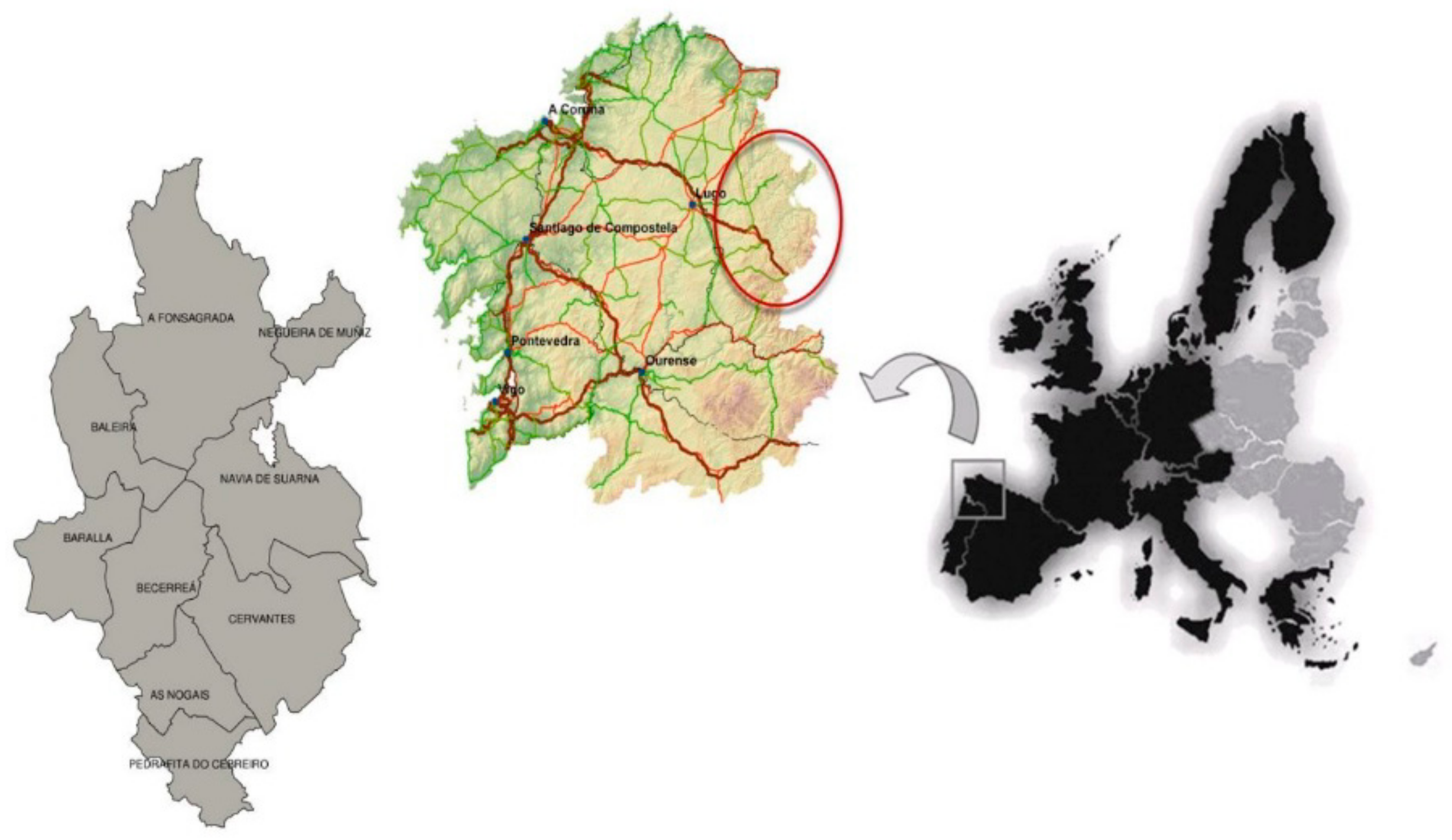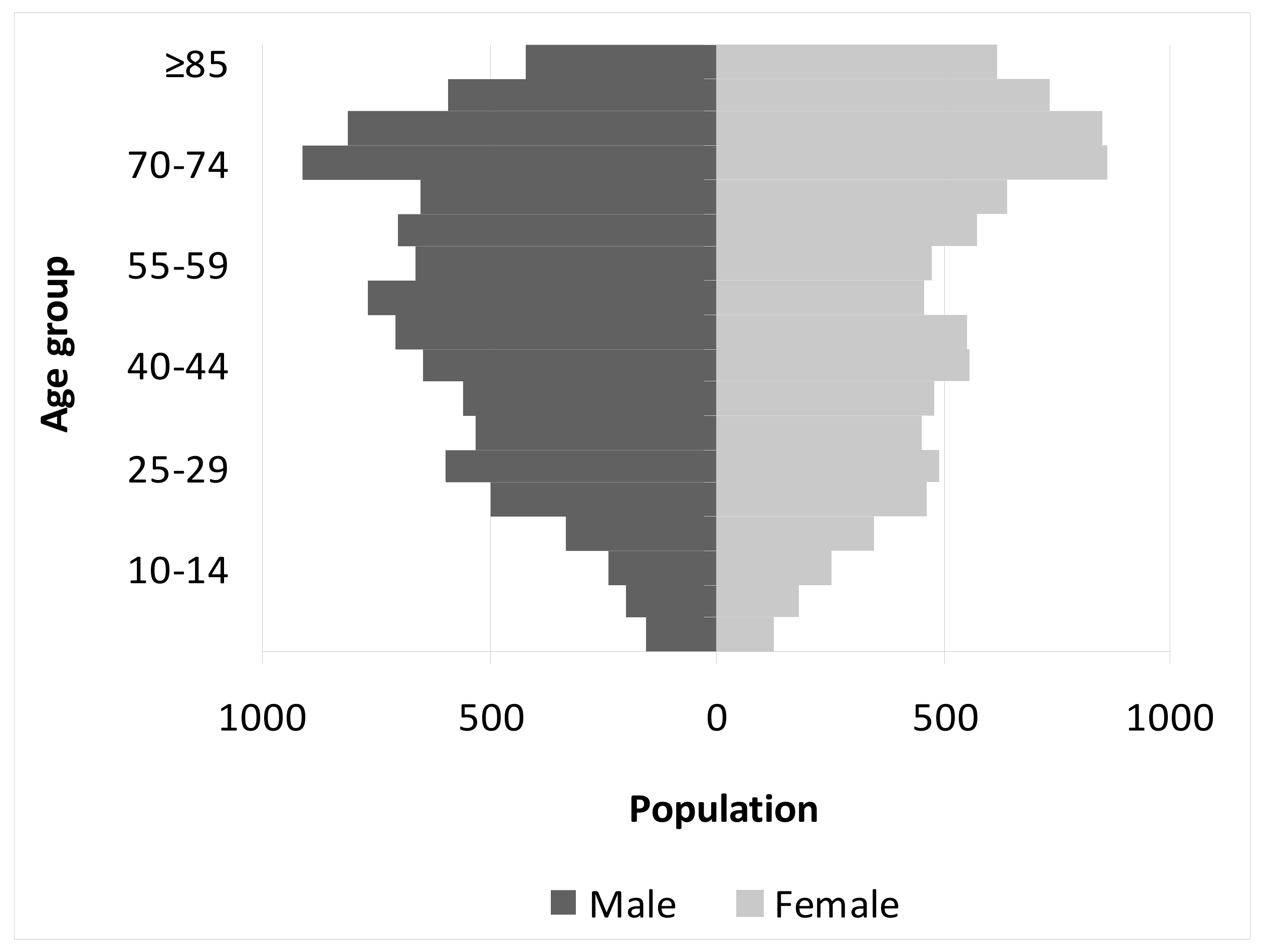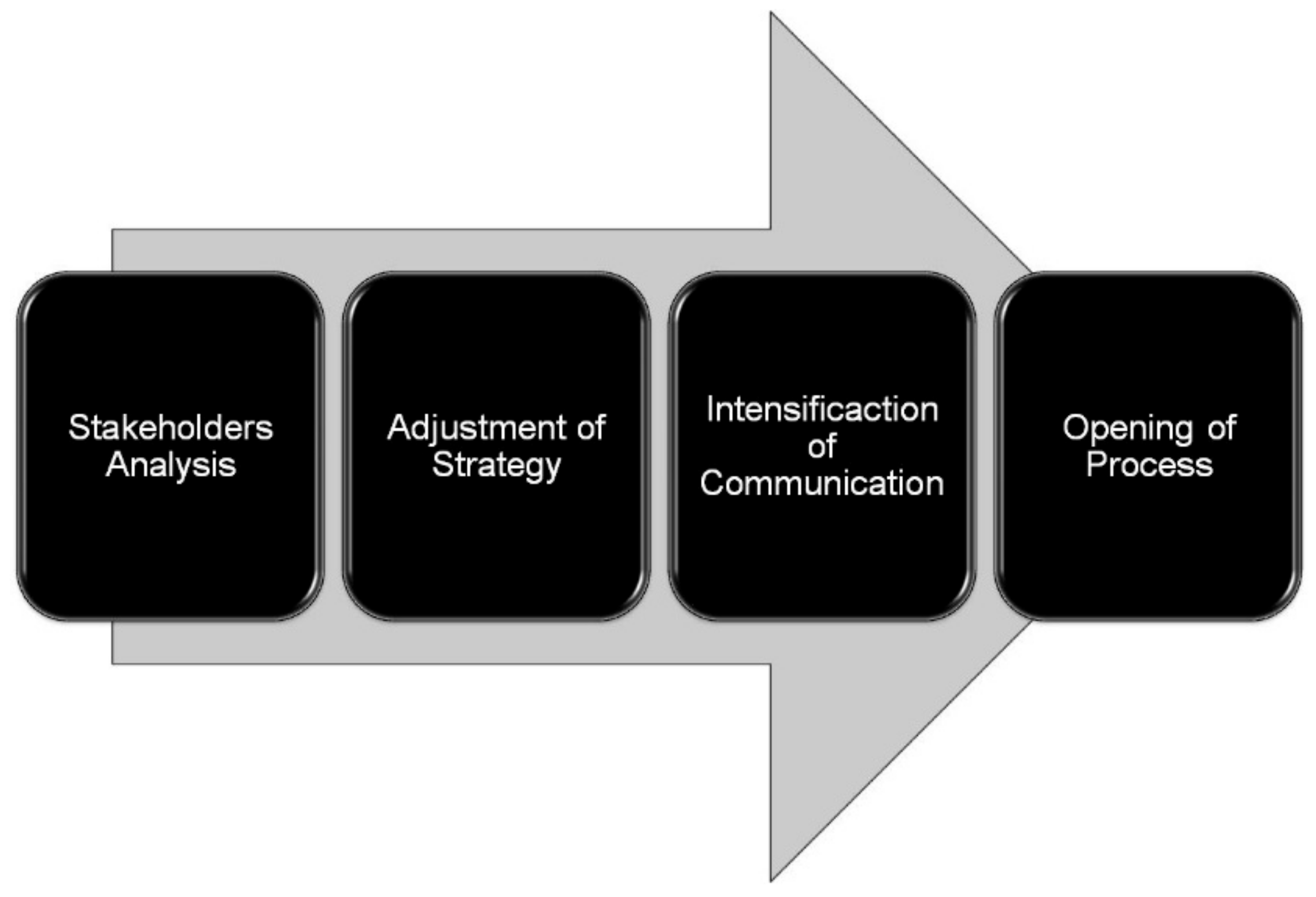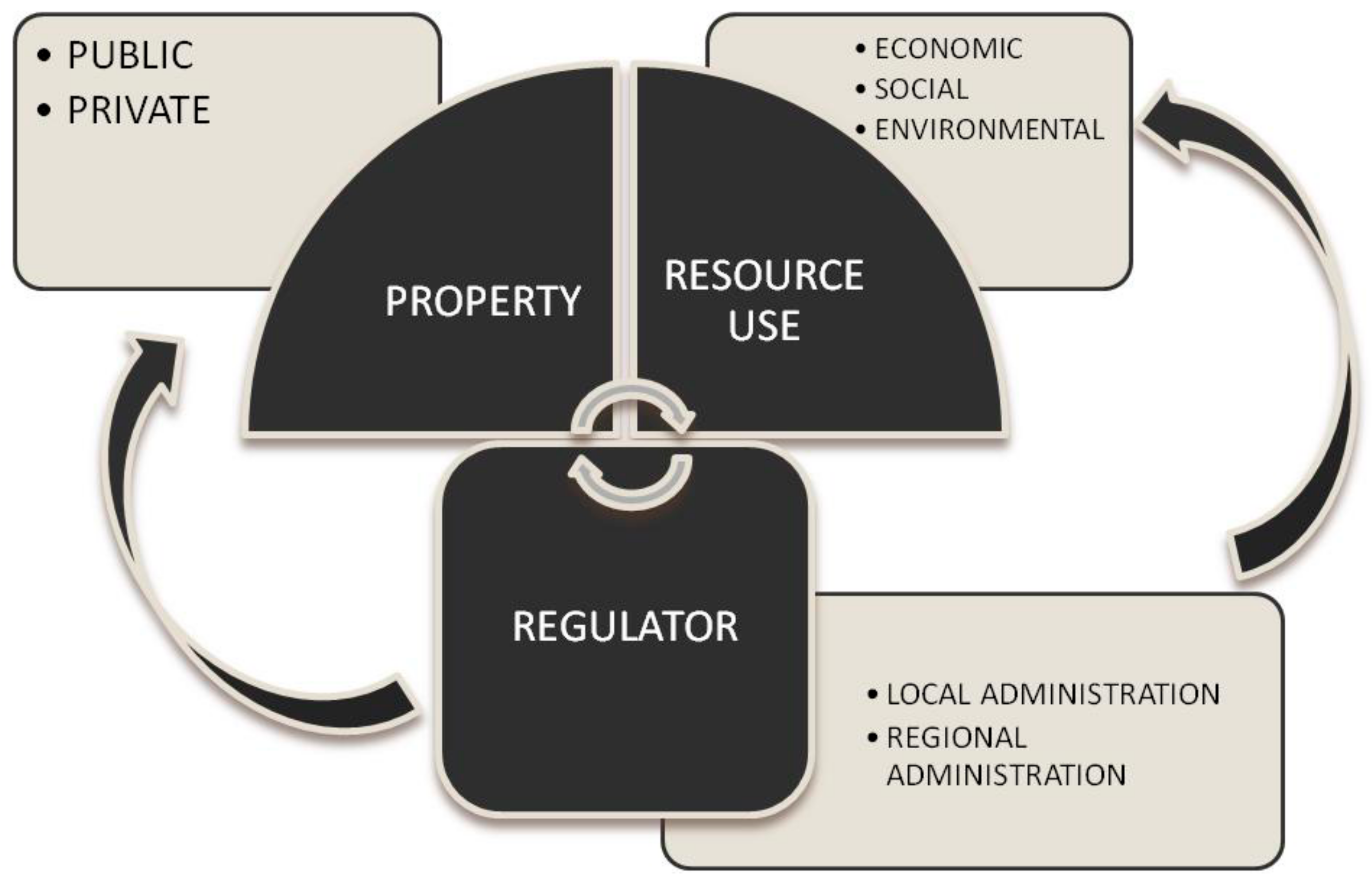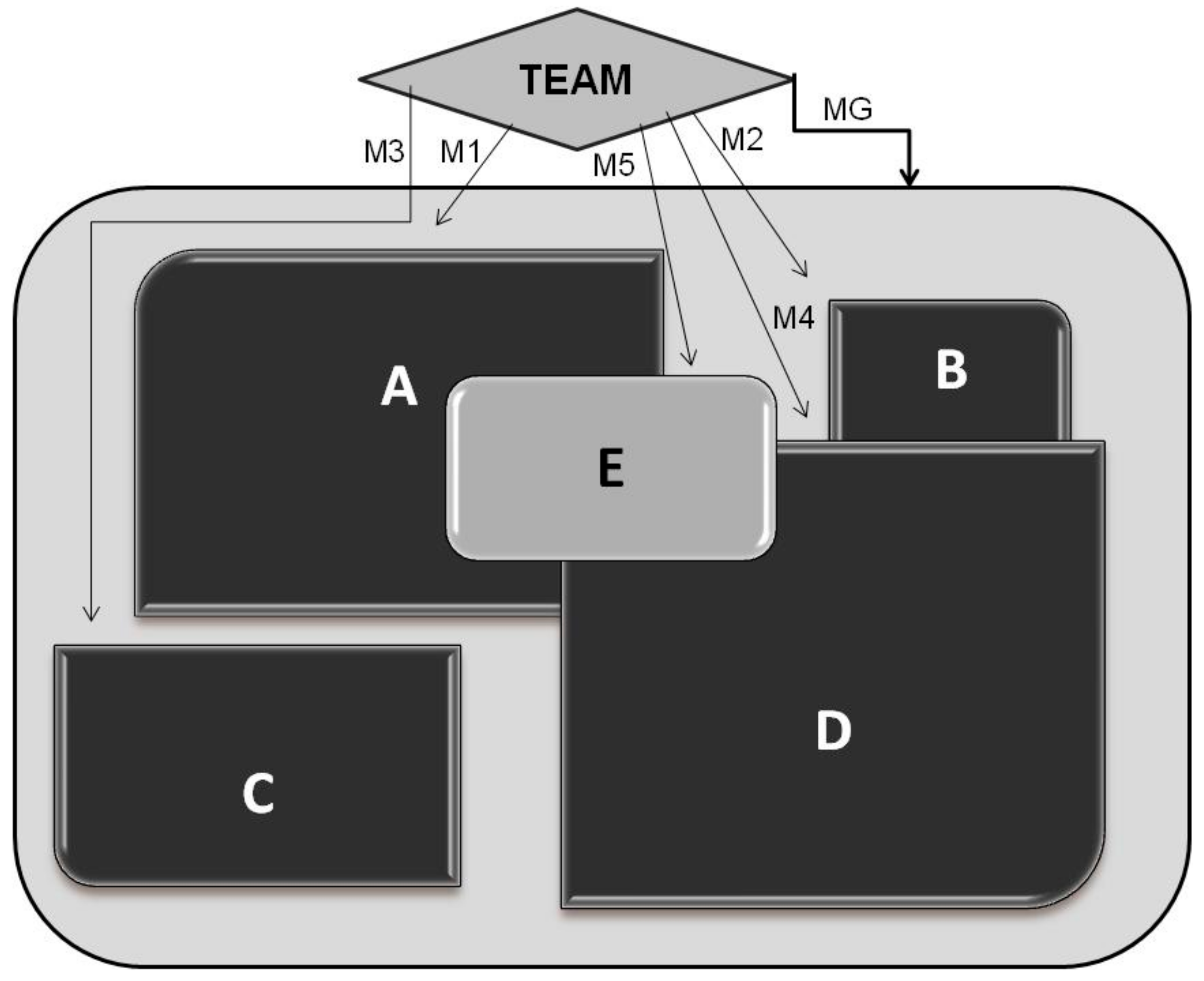1. Introduction
Land planning is a complex issue [
1,
2], an active process that requires careful thought about the future and involves the coordination of all relevant activities for achieving specified goals and objectives [
2]. Planning is an integral component of forest management. It is about determining and expressing the goals and objectives of the government, rural communities or companies, and deciding the targets and steps that should be taken to achieve these objectives [
2]. Planning is not necessarily a complicated process, but it requires clear objectives. It requires imagination and a willingness to consider all points of view relevant to a given situation. The planning process should lead to a balanced outlook from which proposals for effective management can be written [
3].
There is no single universal public participation model, but different ones depending on each particular case [
4]. The studies examined in
Table 1 propose different solutions to the issue of the number of stakeholders involved. The average is of four categories—generic groups of stakeholders—14 groups and 54 participants. There is a higher variability in the number of participants than in the number of stakeholders. It is interesting to identify the elements used to classify and identify stakeholders in the different cases (
Table 1) regardless of the place where they are implemented.
The inclusion of people’s opinions about the technical aspects of forest resources and their management has sparked scientific debate [
5,
6,
7,
8,
9,
10,
11]. In a modern sense, public participation in the devising of forest plans is, preferably, voluntary [
12,
13]. Within public participation processes, people, individually or in organized groups, can exchange information, express opinions and articulate interests with the aim of influencing the final result of decision-making [
12,
13,
14]. It is both an opportunity and a need for society today, as it is a useful tool to avoid conflicts, share information and encourage good relations with the planning team [
15,
16,
17,
18,
19]. Public participation contributes to democratization through the reinforcement of transparency in decision-making: it increases the plurality of aims, encourages mutual learning, and increases the awareness of collective responsibility for natural resource-management questions [
20,
21,
22,
23].
There are several levels of participation within decision-making processes in forest-resource planning. They range from passive participation, where stakeholders are informed about the decisions made by others, to interactive participation, which involves joint decision-making and shared responsibility [
20,
24,
25,
26].
A thorough analysis and classification of stakeholders is essential in the beginning of a public participation process. If important stakeholders are left out, key issues may be ignored and the assessment of the situation will be incomplete [
9,
27]. A second risk of leaving out key stakeholders is that those key stakeholders will use their exclusion to attack the legitimacy of the process as a whole [
28] Multifunctional and modern management requires coordination and agreement between diverging and contradictory stakeholders. Therefore, mutual communication and participation of all identified stakeholders is necessary [
13].
The process of public participation is divided into three consecutive stages: diffusion, debate and proposals. There are many references in the literature regarding the last two stages, debate and proposal selection, especially to the use of multiple criteria decision analysis (MCDA) tools, described by Hwang and Yoon [
29], and used by authors such as: Pykäläinen et al. [
30], Kangas and Kangas [
31], Ananda and Herath [
32,
33], Maness and Farrell [
34], Laukanen et al. [
35], Sheppard and Meitner [
36], Hiltunen et al. [
37], Ananda and Herath [
38], and Hiltunen et al. [
19].
There is an international agreement that participation is a basic principle in forest-resource plans [
39,
40], but there are no guidelines regarding who should participate [
39,
41]. Grimble and Wellard [
42], Banville et al. [
43] and Nordström et al. [
27] define the stakeholder as “someone who is affected by or can affect the situation in some way; that is, the stakeholders have vested interests in the decision problem”. Therefore, stakeholders are the people and the institutions that depend on or obtain benefits from forest resources or those that decide, control or regulate access to those resources [
36]. According to this, stakeholders may or may not be formally organized and individual or collective. For us, participants are the people taking part in the participation process who are members of at least one stakeholder. Sheppard and Meitner [
36] propose the classification of participants according to criteria related to property rights, the history of planning processes, reputation, influence and importance. Gong et al. [
44] consider property rights, social capital and contractual rules as key elements. Nordström et al. [
27] consider that the aims of stakeholder analysis stem from the identification of the most relevant stakeholders and the determination of the scope of their participation. On the one hand, Tikkanen et al. [
45] divide stakeholders in the forestry sector on a regional level into three main groups of cooperation: private forestry-oriented, environment and nature-oriented, and background (the background group is formed by those participants with a mixed orientation between economic and environmental criteria). This clear division may lead the participants to defend their own interests instead of truly collaborating with others. On the other hand, Leskinen [
7] observed that each group of actors has similar aims in relation with forestry programs in all the regions studied, regardless of the characteristics of the forests or the socioeconomic structure of the region. This confirms the existence of general categories of stakeholders [
18]. Recently, Paletto et al. [
46] propose a non-subjective method to identify and classify stakeholders by social network analysis (SNA).
O’Neill [
47] and Elsasser [
39] determined representativity as the main issue in any public participation process. In this sense, a broad representation of various interests in the planing process is essential (McCool and Gutrie [
48]. Sheppard and Meitner [
36] present several criteria for an effective participatory process and the first is a broad representation of stakeholders. For Buchy and Hoverman [
28], representativity is one of the four principles of good practices in public participation from the perspective of the inclusión of all those who would like to participate and to facilitate their participation. Since there is no clear definition, from the perspective of public participation we understand representativity as a balanced and reliable participation of the people and organization with interests in the territory to be planned. Reliable participation is reached when stakeholders and territories are minimally represented in the process.
Examples of different methodologies applied to public participation processes are those by Sheppard and Meitner [
36], Martins and Borges [
49], Díaz-Balteiro and Romero [
1], Food and Agriculture Organization (FAO) [
50], Kangas et al. [
21], and Paletto et al. [
46]. All these works have in common the fact that the process starts with a diffusion stage and includes an appeal for the participation of the population. Authors such as FAO [
50], Beierle and Cayford [
51], Higgs et al. [
25] pose the key questions of who must participate and when. The process has to guarantee representativity [
52], a balanced composition of the participating groups [
24,
53], and the integration of public participation within the technical process for the development of the plan. “The development of rural landscapes is a major challenge for planning and puts a great degree of responsibility in the hands of decision-makers. But successful planning depends on the acceptance of the public and thus interests of stakeholders play a crucial role” [
54]. Diffusion is key in the participative process since it arises from people’s interest in taking part in the process from the beginning. The principles for the success of the public participation process stated by Nordström et al. [
27] depend on this stage.
Public participation in forest-plan design has been a source of scientific debate [
55]. Our contribution in this paper is to answer questions such as who can and must participate in these processes; how many people and how many members of each group can and must participate; how participation should take place; and how much is the cost associated with this process is. To achieve this goal, we propose a methodology of diffusion as a first stage of the public participation process. The methodology is validated in a tactical forest plan in the forest district of Fonsagrada-Os Ancares in the autonomous community of Galicia, north-west Spain.
4. Discussion
As stated by Aasetre [
13], the different interests in the resources to be the subject of planning must be key to defining the structure of participation, so that the sensibilities that influence resource management are included in the planning stage. In the proposed methodology, we identified three universal types of stakeholders: property, forest-resource users and regulators. Other authors establish different numbers: Kangas et al. [
21] propose eight; Marques et al. [
57] and Nordström et al. [
27] propose four; whereas Agnoloni et al. [
58] and Ferretti et al. [
59] propose two. The structure of categories must be simple enough to be capable of extrapolation to a wide range of forest areas. They must also be homogeneous and internally coherent enough to be representative of the interests in resources of each group and to represent all the sensibilities and interests in the land together.
The validation of the methodology has classified 12 groups of stakeholders in the study area. These results coincide with those in Sheppard and Meitner [
36], Primmer and Kyllönen [
56], Hiltunen et al. [
19], Agnoloni et al. [
58], Marques et al. [
57], and Kangas et al. [
21]. This may be due to the repetition of a high number of stakeholders in different times and places. This common group is associated with the categories of property and regulator. The higher or lower number of new stakeholders is motivated by the complexity of the category of forest-resource users. This category depends on the historical component of use and the relative importance of forest activity as a socioeconomic activity, together with the level of definition of the classification methodology used by researchers.
Once the structure of participation has been developed, the next question is related to stakeholder representativity. Our methodological proposal takes into account the proposals by Janse and Konijnendijk [
18] that considered that the number of participants was conditioned by factors related to participation tools and communication, always adapted to the place and time of the process. As pointed by Côté and Bouthillier [
53], it is necessary to consider the dimension of the area and the time available for the process.
There is a high number of participants in the validation, 303, 1.32% of the initial population, which contrasts with an average of 54 in similar works consulted (
Table 1). The territorial distribution is considerably higher than the average of the referenced processes at 0.2 participants/km
2.
The results show that, using the validated methodology, we obtained six times more participants than the average with a similar number of stakeholders. Our effort in the diffusion stage has allowed us to obtain a level of representativity measurable in terms of stakeholders and territories. Gaining participants in the amount and distribution considered as objective was not achieved in the first stage, and it was necessary to resort to the stage of intensification of communication.
It is necessary to assess participant representativity [
39,
47] and whether participants are evenly distributed [
9,
27,
39]. Herein lies the importance that all interests groups are present and that their representation in the public participation process is proportional to its real representation in the initial population. The statistical validation guarantees the representativity of the process.
The next question answered is whether the diffusion process has been attractive enough. We considered the relationship between the number of people registered and the number of those who attended informative meetings. The global result is that 63.26% of participants in the meeting registered and participated in the process. Purdon [
74] stated the need for more transparent participative processes so that they could be more attractive to the population. Leskinen [
7] includes environmental aspects which will raise people’s interest in participating in planning.
Deming [
71] stated that one of the challenges of research in public participation is to achieve efficient methodologies. So far the works revised have not been concerned with this issue. However, the results obtained with the methodology we propose show that the cost or effort is relatively low, making it a highly efficient methodological process.
The methodology proposed for the case study can be replicated in other forest-planning processes taking into account the local characteristics in each area as key elements for the methodology’s adaptation: to carry out a correct stakeholder analysis in the area, to establish a representation percentage, a strategy considering the role of each stakeholder, and to increase diffusion in those groups that do not reach the initial representation aim.
Currently, we do not have data about the cost of the diffusion stage of public participation processes in forest planning. Our methodology aims to offer an answer to this question.
A more intensive process could improve performance and innovation [
21,
51]. In some processes, participants find that too much time is devoted to participation [
21], so it is necessary to find a balance between participants’ time and the results aimed. Thus, it is necessary to use new technologies to decrease displacements and meeting times.
5. Conclusions
Public participation processes within forest plans are currently being debated. Our work attempts to answer some of the uncertainties that have been formulated. After the implementation of the diffusion stage in the forest plan in the district of Fonsagrada-Os Ancares some answers that help to improve public participation can be provided for application to similar processes.
The diffusion stage has been proved to be an essential phase in the beginning of forest-resource planning processes. It has a high influence in stakeholder representativity that will, in turn, influence the rest of the processes, both regarding the quality of proposals and the actual forest management [
75].
The literature reviewed, while highlighting the importance of diffusion in participatory processes, does not clearly establish indicators of appropriate levels. Our contribution focuses on proposing measurable objectives adapted to the characteristics of the area and a method to achieve them.
Diffusion processes are important because they provide the participative process with “raw material” and “fuel”. The diffusion stage is a key element in the process because failure at this stage means failure of the overall process. The aim of this is to raise interest and ensure a sufficient number of stable participants for the process to fulfil the representativity criteria. In this case, 63% of those attending the information meetings participated in the whole process.
Once the aim of attracting the attention of a representative percentage of the population has been fulfilled, the challenge is to keep the attention of the highest possible number of participants throughout the process so that they provide information and knowledge right up to the conclusion of the plan.
The minimum number of participants is going to depend on the percentage fixed at the beginning of the process, which must be established considering both the territory and the sector. The validation of participant representativity will be determined by the fulfillment of the minimum percentage (at territorial and sectorial level) and the analysis of theoretical participant distribution in contrast to the actual distribution. In case the minimum percentage is not reached (1% of the initial population in our case), it is necessary to increase diffusion until it is reached. It is also necessary to apply statistical contrasts to verify that results have been achieved, in our case, the T test for dependent samples.
The cost of the process is a limiting factor for its generalization in an area. In this case, it has been considered in every stage and the optimization of financial resources has resulted in an economical process with a total cost of 5 €/km2 or 25 €/participant.
When a process begins it is necessary to have real public participation and, in this sense, new technologies are very efficient at providing transparency, swiftness and equity in the process. In the case described in this work, the web page of the forest plan ensured the transparency of the process, allowing 5% of the population to follow it.
